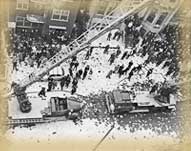 |
Sir George Williams Riot, 1969 |
Intellectuals such as Jacques Bergue, Albert Memmi and Frantz Fanon developed a conceptual framework which saw colonialism divide human groups. The colonizer systematically suppressing the culture, language and history of the colonized. Such a process leads to the internalization of racist structures by both sides of the power relations, which can still persist in neo-colonial forms. The Quebec protest movement would infuse these ideas with the specificity of anti-colonial Marxism, which Robert Young claims "emphasizes [...] the untranslatability of revolutionary practices, the need for attention to local forms, and the translation of the universal into the idiom of the local." (34) Mill sees the Partis Pris as having the largest impact on the "language of dissent" in Quebec. This publishing house cum political party saw the Catholic Church as a primary mechanism of colonial power and adopted a program of secularization, independence and socialism. With these ideas and the demographic transition fuelled by increased immigration, the post-war baby boom, and urbanization, Montreal became a hot-bed of criticism against what was increasingly characterized as a unjust colonial system.
Mills traces the rise of social protest groups which differentiated themselves due to race, gender, language and class, emphasizing their shared international influences in the realm of post-colonial thought. The emphasis is on the writers of the manifestos and the intellectual leadership, and it is noted that the postcolonial message is diluted when analysis strays from these "elites" to the rhetoric of the street protest. As militant protest rose after 1968, a blend of socialist decolonization, Marxism and the old "tropes of traditional nationalism" were prevalent in popular protest. (158) While an underlying nostalgia seems impossible to avoid in dealing with the sixties era, Mills does not romanticize his subjects. The macho and masculine discourse of black-power is shown to exclude women, the FLQ's accusations against Trudeau are denounced as homophobic, and women's groups are seen splintered along the lines of whether to include men in their struggle. It seems that the non-hierarchical and democratic nature of many protest groups made for unification against a common enemy at first, but then led to dissipation and internal conflict. Ultimately, leftist protest and their post-colonial framework was usurped by the class-based analysis of the labour movement.
 |
| Student Protest Montreal, October 1968 |
Mills' work approaches a stand-alone history of the Quiet Revolution, yet its focus is clearly on the left, leaving the provincial and Catholic Church's reactions to the protest movement to other monographs. Also remaining unexplored is the intertwined conceptual framework of Marxist structures with post-colonial thought, which is perhaps germane to a history of leftist protest. The extent to which the post-colonial thought of the manifesto writers was on the public's mind is left ambiguous by Mills' brief comments on the rhetoric of street-protest, but an analysis of the broader public discourse during the era is perhaps another book awaiting its author. The clean sweep of historical awards granted The Empire Within shows that historical establishment is favourable to Mills' work. For moving beyond an exceptional Quebec in this transnational approach, rising above a historiography focused on the radicals behind the October Crisis, and providing an excellent readable history of a fascinating period of Quebec, Mills' work is a necessary addition to the literature of the period.
Sean Mills, The Empire Within: Postcolonial Thought and Political Activism in Sixties Montreal (McGill: Montreal, 2010).
No comments:
Post a Comment